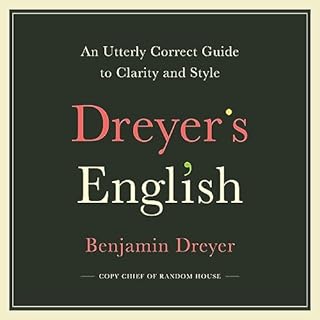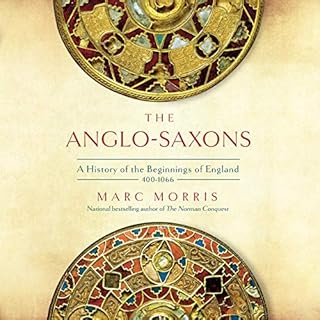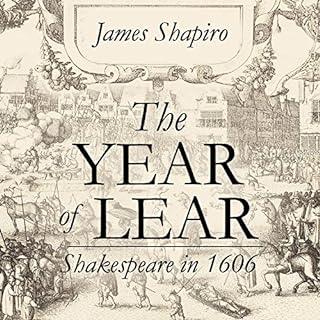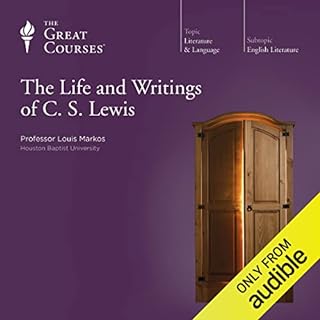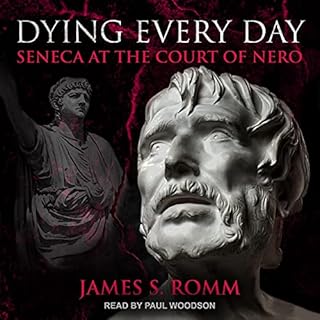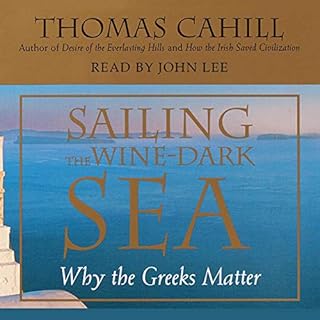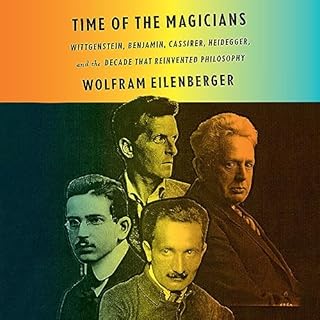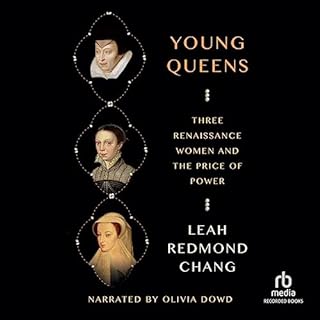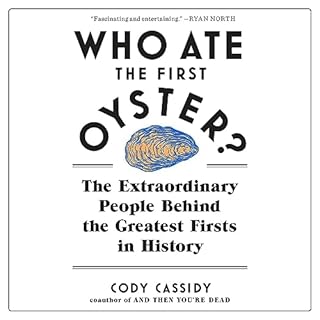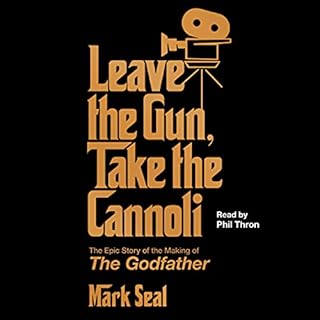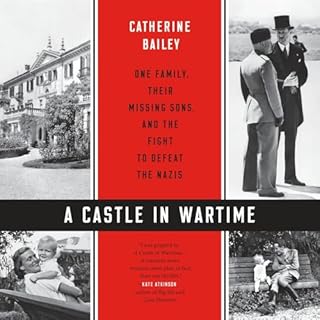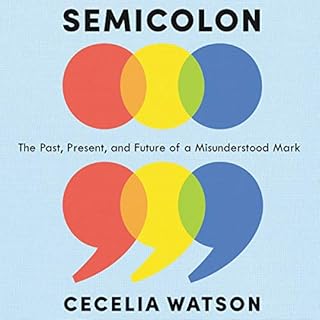-
This Is Shakespeare
- Narrado por: Emma Smith
- Duración: 9 h y 54 m
No se pudo agregar al carrito
Add to Cart failed.
Error al Agregar a Lista de Deseos.
Error al eliminar de la lista de deseos.
Error al añadir a tu biblioteca
Error al seguir el podcast
Error al dejar de seguir el podcast
 Exclusivo para miembros Prime: ¿Nuevo en Audible? Obtén 2 audiolibros gratis con tu prueba.
Exclusivo para miembros Prime: ¿Nuevo en Audible? Obtén 2 audiolibros gratis con tu prueba.Compra ahora por $18.00
No default payment method selected.
We are sorry. We are not allowed to sell this product with the selected payment method
Resumen del Editor
An electrifying new study that investigates the challenges of the Bard's inconsistencies and flaws, and focuses on revealing - not resolving - the ambiguities of the plays and their changing topicality
A genius and prophet whose timeless works encapsulate the human condition like no other. A writer who surpassed his contemporaries in vision, originality, and literary mastery. A man who wrote like an angel, putting it all so much better than anyone else. Is this Shakespeare? Well, sort of. But it doesn't tell us the whole truth. So much of what we say about Shakespeare is either not true, or just not relevant.
In This Is Shakespeare, Emma Smith - an intellectually, theatrically, and ethically exciting writer - takes us into a world of politicking and copycatting, as we watch Shakespeare emulating the blockbusters of Christopher Marlowe and Thomas Kyd (the Spielberg and Tarantino of their day), flirting with and skirting around the cutthroat issues of succession politics, religious upheaval, and technological change. Smith writes in strikingly modern ways about individual agency, privacy, politics, celebrity, and sex. Instead of offering the answers, the Shakespeare she reveals poses awkward questions, always inviting the reader to ponder ambiguities.
Los oyentes también disfrutaron...
-
Portable Magic
- A History of Books and Their Readers
- De: Emma Smith
- Narrado por: Emma Smith
- Duración: 8 h y 25 m
- Versión completa
-
General4.5 out of 5 stars 13
-
Narración:4.5 out of 5 stars 10
-
Historia4.5 out of 5 stars 9
Stephen King once said that books are “a uniquely portable magic.” Here, Emma Smith takes listeners on a literary adventure that spans centuries and circles the globe to uncover the reasons behind our obsession with this captivating object. From disrupting the Western myth that the Gutenberg Press was the original printing project, to the decorative gift books that radicalized women to join the anti-slavery movement, to paperbacks being weaponized during World War II, to a book made entirely of cheese, Portable Magic explores how, when, and why books became so iconic.
De: Emma Smith
-
For the Love of Music
- A Conductor's Guide to the Art of Listening
- De: John Mauceri
- Narrado por: John Mauceri
- Duración: 6 h y 8 m
- Versión completa
-
General5 out of 5 stars 34
-
Narración:5 out of 5 stars 29
-
Historia4.5 out of 5 stars 30
With a lifetime of experience, profound knowledge and understanding, and heartwarming appreciation, an internationally celebrated conductor and teacher answers the questions: Why should I listen to classical music? How can I get the most from the listening experience? Unpretentious, graceful, instructive, this is a book for the aficionado, the novice, and anyone looking to have the love of music fired within them.
-
5 out of 5 stars
-
Divine Time with a Maestro
- De Meg en 12-18-19
De: John Mauceri
-
Written in History
- Letters That Changed the World
- De: Simon Sebag Montefiore
- Narrado por: Simon Russell Beale, Tuppence Middleton, Rupert Penry-Jones, y otros
- Duración: 7 h y 29 m
- Versión completa
-
General4.5 out of 5 stars 17
-
Narración:5 out of 5 stars 16
-
Historia4.5 out of 5 stars 16
Written in History: Letters that Changed the World celebrates the great letters of world history, and cultural and personal life. Bestselling, prizewinning historian Simon Sebag Montefiore selects letters that have changed the course of global events or touched a timeless emotion—whether passion, rage, humor—from ancient times to the twenty-first century. Some are noble and inspiring, some despicable and unsettling, some are exquisite works of literature, others brutal, coarse, and frankly outrageous, many are erotic, others heartbreaking.
-
5 out of 5 stars
-
A great collection.
- De brian en 06-11-20
-
Love and Hate in Jamestown
- John Smith, Pocahontas, and the Start of a New Nation
- De: David A. Price
- Narrado por: Josh Innerst
- Duración: 10 h y 52 m
- Versión completa
-
General4.5 out of 5 stars 64
-
Narración:4.5 out of 5 stars 56
-
Historia4.5 out of 5 stars 56
Drawing on period letters and chronicles, and on the papers of the Virginia Company - which financed the settlement of Jamestown - David Price tells a tale of cowardice and courage, stupidity and brilliance, tragedy and costly triumph. He takes us into the day-to-day existence of the English men and women whose charge was to find gold and a route to the Orient, and who found, instead, hardship and wretched misery. Death, in fact, became the settlers' most faithful companion, and their infighting was ceaseless.
-
5 out of 5 stars
-
Five Star History!
- De Damian en 08-13-23
De: David A. Price
-
Know Thyself
- Western Identity from Classical Greece to the Renaissance
- De: Ingrid Rossellini
- Narrado por: January LaVoy
- Duración: 14 h y 44 m
- Versión completa
-
General4.5 out of 5 stars 23
-
Narración:4.5 out of 5 stars 21
-
Historia4 out of 5 stars 20
"Know thyself" - this fundamental imperative appeared for the first time in ancient Greece. For the Greeks, self-knowledge and identity were the basics of their civilization and their sources were to be found in where one was born and into which social group. These determined who you were and what your duties were. In this book the independent scholar Ingrid Rossellini surveys the major ideas that, from Greek and Roman antiquity through the Christian medieval era up to the dawn of modernity in the Renaissance, have guided the Western project of self-knowledge.
-
4 out of 5 stars
-
Ideas +major proponents, filtered through the arts
- De Philo en 06-20-18
-
Ex Libris
- 100+ Books to Read and Reread
- De: Michiko Kakutani
- Narrado por: Tavia Gilbert
- Duración: 8 h y 1 m
- Versión completa
-
General4 out of 5 stars 15
-
Narración:4.5 out of 5 stars 13
-
Historia4 out of 5 stars 13
“Books can connect people across time zones and zip codes, across cultures, national boundaries, and historical eras”, Kakutani writes in her introduction to Ex Libris. Here listeners will discover novels and memoirs by some of the most gifted writers working today; favorite classics worth listening or relistening; and nonfiction works, both old and new, that illuminate our social and political landscape and some of today’s most pressing issues, from climate change to medicine to the consequences of digital innovation.
De: Michiko Kakutani
-
Portable Magic
- A History of Books and Their Readers
- De: Emma Smith
- Narrado por: Emma Smith
- Duración: 8 h y 25 m
- Versión completa
-
General4.5 out of 5 stars 13
-
Narración:4.5 out of 5 stars 10
-
Historia4.5 out of 5 stars 9
Stephen King once said that books are “a uniquely portable magic.” Here, Emma Smith takes listeners on a literary adventure that spans centuries and circles the globe to uncover the reasons behind our obsession with this captivating object. From disrupting the Western myth that the Gutenberg Press was the original printing project, to the decorative gift books that radicalized women to join the anti-slavery movement, to paperbacks being weaponized during World War II, to a book made entirely of cheese, Portable Magic explores how, when, and why books became so iconic.
De: Emma Smith
-
For the Love of Music
- A Conductor's Guide to the Art of Listening
- De: John Mauceri
- Narrado por: John Mauceri
- Duración: 6 h y 8 m
- Versión completa
-
General5 out of 5 stars 34
-
Narración:5 out of 5 stars 29
-
Historia4.5 out of 5 stars 30
With a lifetime of experience, profound knowledge and understanding, and heartwarming appreciation, an internationally celebrated conductor and teacher answers the questions: Why should I listen to classical music? How can I get the most from the listening experience? Unpretentious, graceful, instructive, this is a book for the aficionado, the novice, and anyone looking to have the love of music fired within them.
-
5 out of 5 stars
-
Divine Time with a Maestro
- De Meg en 12-18-19
De: John Mauceri
-
Written in History
- Letters That Changed the World
- De: Simon Sebag Montefiore
- Narrado por: Simon Russell Beale, Tuppence Middleton, Rupert Penry-Jones, y otros
- Duración: 7 h y 29 m
- Versión completa
-
General4.5 out of 5 stars 17
-
Narración:5 out of 5 stars 16
-
Historia4.5 out of 5 stars 16
Written in History: Letters that Changed the World celebrates the great letters of world history, and cultural and personal life. Bestselling, prizewinning historian Simon Sebag Montefiore selects letters that have changed the course of global events or touched a timeless emotion—whether passion, rage, humor—from ancient times to the twenty-first century. Some are noble and inspiring, some despicable and unsettling, some are exquisite works of literature, others brutal, coarse, and frankly outrageous, many are erotic, others heartbreaking.
-
5 out of 5 stars
-
A great collection.
- De brian en 06-11-20
-
Love and Hate in Jamestown
- John Smith, Pocahontas, and the Start of a New Nation
- De: David A. Price
- Narrado por: Josh Innerst
- Duración: 10 h y 52 m
- Versión completa
-
General4.5 out of 5 stars 64
-
Narración:4.5 out of 5 stars 56
-
Historia4.5 out of 5 stars 56
Drawing on period letters and chronicles, and on the papers of the Virginia Company - which financed the settlement of Jamestown - David Price tells a tale of cowardice and courage, stupidity and brilliance, tragedy and costly triumph. He takes us into the day-to-day existence of the English men and women whose charge was to find gold and a route to the Orient, and who found, instead, hardship and wretched misery. Death, in fact, became the settlers' most faithful companion, and their infighting was ceaseless.
-
5 out of 5 stars
-
Five Star History!
- De Damian en 08-13-23
De: David A. Price
-
Know Thyself
- Western Identity from Classical Greece to the Renaissance
- De: Ingrid Rossellini
- Narrado por: January LaVoy
- Duración: 14 h y 44 m
- Versión completa
-
General4.5 out of 5 stars 23
-
Narración:4.5 out of 5 stars 21
-
Historia4 out of 5 stars 20
"Know thyself" - this fundamental imperative appeared for the first time in ancient Greece. For the Greeks, self-knowledge and identity were the basics of their civilization and their sources were to be found in where one was born and into which social group. These determined who you were and what your duties were. In this book the independent scholar Ingrid Rossellini surveys the major ideas that, from Greek and Roman antiquity through the Christian medieval era up to the dawn of modernity in the Renaissance, have guided the Western project of self-knowledge.
-
4 out of 5 stars
-
Ideas +major proponents, filtered through the arts
- De Philo en 06-20-18
-
Ex Libris
- 100+ Books to Read and Reread
- De: Michiko Kakutani
- Narrado por: Tavia Gilbert
- Duración: 8 h y 1 m
- Versión completa
-
General4 out of 5 stars 15
-
Narración:4.5 out of 5 stars 13
-
Historia4 out of 5 stars 13
“Books can connect people across time zones and zip codes, across cultures, national boundaries, and historical eras”, Kakutani writes in her introduction to Ex Libris. Here listeners will discover novels and memoirs by some of the most gifted writers working today; favorite classics worth listening or relistening; and nonfiction works, both old and new, that illuminate our social and political landscape and some of today’s most pressing issues, from climate change to medicine to the consequences of digital innovation.
De: Michiko Kakutani
-
Dreyer's English
- An Utterly Correct Guide to Clarity and Style
- De: Benjamin Dreyer
- Narrado por: Benjamin Dreyer, Alison Fraser
- Duración: 9 h y 38 m
- Versión completa
-
General4.5 out of 5 stars 342
-
Narración:4.5 out of 5 stars 297
-
Historia4.5 out of 5 stars 284
As Random House’s copy chief, Dreyer has upheld the standards of the legendary publisher for more than two decades. He is beloved by authors and editors alike - not to mention his followers on social media - for deconstructing the English language with playful erudition. Now, he distills everything he has learned from the myriad books he has copyedited and overseen into a useful guide not just for writers but for everyone who wants to put their best prose foot forward.
-
5 out of 5 stars
-
You'll be horrified at a lifetime of usage errors.
- De RTaylor en 05-16-19
De: Benjamin Dreyer
-
The Anglo-Saxons
- A History of the Beginnings of England: 400 - 1066
- De: Marc Morris
- Narrado por: Roy McMillan
- Duración: 13 h y 18 m
- Versión completa
-
General4.5 out of 5 stars 916
-
Narración:5 out of 5 stars 807
-
Historia4.5 out of 5 stars 803
Sixteen hundred years ago Britain left the Roman Empire and swiftly fell into ruin. Grand cities and luxurious villas were deserted and left to crumble, and civil society collapsed into chaos. Into this violent and unstable world came foreign invaders from across the sea, and established themselves as its new masters. The Anglo-Saxons traces the turbulent history of these people across the next six centuries. It explains how their earliest rulers fought relentlessly against each other for glory and supremacy, and then were almost destroyed by the onslaught of the vikings.
-
3 out of 5 stars
-
"Pretty Good"
- De Stephen en 05-30-21
De: Marc Morris
-
The Year of Lear
- Shakespeare in 1606
- De: James Shapiro
- Narrado por: Robert Fass
- Duración: 11 h y 6 m
- Versión completa
-
General4.5 out of 5 stars 190
-
Narración:4.5 out of 5 stars 165
-
Historia4.5 out of 5 stars 161
In the years leading up to 1606, since the death of Queen Elizabeth and the arrival in England of her successor, King James of Scotland, Shakespeare's great productivity had ebbed, and it may have seemed to some that his prolific genius was a thing of the past. But that year, at age 42, he found his footing again, finishing a play he had begun the previous autumn - King Lear - then writing two other great tragedies, Macbeth and Antony and Cleopatra.
-
4 out of 5 stars
-
Detailed and satisfying
- De Tad Davis en 02-24-16
De: James Shapiro
-
Fantastic Numbers and Where to Find Them
- A Cosmic Quest from Zero to Infinity
- De: Antonio Padilla
- Narrado por: Antonio Padilla
- Duración: 13 h y 53 m
- Versión completa
-
General4.5 out of 5 stars 57
-
Narración:4.5 out of 5 stars 50
-
Historia4 out of 5 stars 50
For particularly brilliant theoretical physicists like James Clerk Maxwell, Paul Dirac, or Albert Einstein, the search for mathematical truths led to strange new understandings of the ultimate nature of reality. But what are these truths? What are the mysterious numbers that explain the universe? In Fantastic Numbers and Where to Find Them, the leading theoretical physicist and YouTube star Antonio Padilla takes us on an irreverent cosmic tour of nine of the most extraordinary numbers in physics, offering a startling picture of how the universe works.
-
3 out of 5 stars
-
Exciting, Strange, Difficult = Meh
- De Michael en 05-23-23
De: Antonio Padilla
-
My Shakespeare
- A Director’s Journey Through the First Folio
- De: Greg Doran
- Narrado por: Greg Doran
- Duración: 18 h y 22 m
- Versión completa
-
General4.5 out of 5 stars 13
-
Narración:5 out of 5 stars 10
-
Historia5 out of 5 stars 10
This book charts the personal and professional journey of Greg Doran, Artistic Director of the Royal Shakespeare Company, from 2012 until 2022. My Shakespeare uniquely captures the excitement, energy, surprises, joys and agonies of working on the greatest of plays; sheds new light on these plays through Doran’s own research and discoveries made in the rehearsal room; and gives unprecedented access into the craft, life and loves of this exceptional director.
-
5 out of 5 stars
-
Amazing journey
- De klm en 02-09-24
De: Greg Doran
-
Hannibal
- De: Patrick N. Hunt
- Narrado por: James Cameron Stewart
- Duración: 11 h y 27 m
- Versión completa
-
General4.5 out of 5 stars 261
-
Narración:4.5 out of 5 stars 229
-
Historia4.5 out of 5 stars 229
One of the greatest commanders of the ancient world brought vividly to life: Hannibal, the brilliant general who successfully crossed the Alps with his war elephants and brought Rome to its knees. Hannibal Barca of Carthage, born 247 BC, was one of the great generals of the ancient world. Historian Patrick N. Hunt has led archaeological expeditions in the Alps and elsewhere to study Hannibal's achievements. Now he brings Hannibal's incredible story to life in this riveting and dramatic audiobook.
-
4 out of 5 stars
-
A monotone mundane narration
- De Jeff Lacy en 05-22-20
De: Patrick N. Hunt
-
Shakespeare in a Divided America
- What His Plays Tell Us About Our Past and Future
- De: James Shapiro
- Narrado por: Fred Sanders
- Duración: 9 h y 11 m
- Versión completa
-
General4.5 out of 5 stars 325
-
Narración:4.5 out of 5 stars 281
-
Historia4.5 out of 5 stars 278
The plays of William Shakespeare are rare common ground in the United States. For well over two centuries, Americans of all stripes—presidents and activists, soldiers and writers, conservatives and liberals alike—have turned to Shakespeare’s works to explore the nation’s fault lines. In a narrative arching from Revolutionary times to the present day, leading scholar James Shapiro traces the unparalleled role of Shakespeare’s four-hundred-year-old tragedies and comedies in illuminating the many concerns on which American identity has turned.
-
5 out of 5 stars
-
An Entertaining History Lesson
- De David en 08-17-20
De: James Shapiro
-
Will in the World
- How Shakespeare Became Shakespeare
- De: Stephen Greenblatt
- Narrado por: Peter Jay Fernandez
- Duración: 15 h y 21 m
- Versión completa
-
General4.5 out of 5 stars 560
-
Narración:4.5 out of 5 stars 356
-
Historia4.5 out of 5 stars 356
Award-winning author Stephen Greenblatt is one of the most influential literary thinkers in the world. An acclaimed interpreter of Shakespeare's works, his ideas have changed the way countless people approach the classics. Now Greenblatt's uniquely brilliant voice delivers a magnificent biography of the Bard himself.
-
2 out of 5 stars
-
Politically Motivated
- De Donald en 09-29-04
-
Shakespeare
- The World as Stage
- De: Bill Bryson
- Narrado por: Bill Bryson
- Duración: 5 h y 29 m
- Versión completa
-
General4.5 out of 5 stars 1,856
-
Narración:4.5 out of 5 stars 1,283
-
Historia4.5 out of 5 stars 1,271
William Shakespeare, the most celebrated poet in the English language, left behind nearly a million words of text, but his biography has long been a thicket of wild supposition arranged around scant facts. With a steady hand and his trademark wit, Bill Bryson sorts through this colorful muddle to reveal the man himself.
-
4 out of 5 stars
-
Too Little, Too Short
- De Charles L. Burkins en 11-30-07
De: Bill Bryson
-
Shakespeare
- The Biography
- De: Peter Ackroyd
- Narrado por: Simon Vance
- Duración: 19 h y 11 m
- Versión completa
-
General4.5 out of 5 stars 282
-
Narración:4.5 out of 5 stars 181
-
Historia4.5 out of 5 stars 181
Only Peter Ackroyd can combine narrative and unique observation with a sharp eye for the fascinating fact. His method is to position Shakespeare in the close context of his world. In this way, he not only richly conjures up the texture of Shakespeare’s life, but also imparts an amazing amount of vivid, interesting material about place, period and background.
-
5 out of 5 stars
-
Shakespeare by Peter Ackroyd
- De Four Bears en 10-16-06
De: Peter Ackroyd
-
Inventing America
- Jefferson's Declaration of Independence
- De: Garry Wills
- Narrado por: Tom Weitzel
- Duración: 18 h y 11 m
- Versión completa
-
General4.5 out of 5 stars 9
-
Narración:4 out of 5 stars 9
-
Historia4.5 out of 5 stars 9
From acclaimed historian Garry Wills, author of Lincoln at Gettysburg, a celebrated re-appraisal of the meaning and the source of inspiration of The Declaration of Independence, based on a reading of Jefferson's original draft document.
-
5 out of 5 stars
-
Very interesting treatise
- De Larry and Cindi en 07-17-23
De: Garry Wills
-
The Life and Writings of C. S. Lewis
- De: Louis Markos, The Great Courses
- Narrado por: Louis Markos
- Duración: 6 h y 5 m
- Grabación Original
-
General4.5 out of 5 stars 522
-
Narración:4.5 out of 5 stars 457
-
Historia4.5 out of 5 stars 453
What can we still learn from C.S. Lewis? Find out in these 12 insightful lectures that cover the author's spiritual autobiography, novels, and his scholarly writings that reflect on pain and grief, love and friendship, prophecy and miracles, and education and mythology.
-
3 out of 5 stars
-
Basically a collection of sermons
- De Richard en 11-20-13
De: Louis Markos, y otros
Reseñas de la Crítica
"I admire the freshness and attack of her writing, the passion and curiosity that light up the page." (Hilary Mantel, author of Wolf Hall and Bring Up the Bodies)
"If I were asked to recommend one guide for readers keen on discovering what's at stake in Shakespeare's plays, This Is Shakespeare would be it." (James Shapiro, author of The Year of Lear: Shakespeare in 1606)
"Brilliantly illuminating.... The best introduction to Shakespeare’s plays that I've read, perhaps the best book on Shakespeare, full stop. Emma Smith's voice is disarmingly frank, refreshingly irreverent, full of pop culture.... Her reading of the plays is dazzling, her original research totally convincing." (Alex Preston, The Observer, London)
Relacionado con este tema
-
The Creation of Anne Boleyn
- A New Look at England’s Most Notorious Queen
- De: Susan Bordo
- Narrado por: Barbara Rosenblat
- Duración: 12 h
- Versión completa
-
General4 out of 5 stars 408
-
Narración:4 out of 5 stars 373
-
Historia4 out of 5 stars 371
Part biography, part cultural history, The Creation of Anne Boleyn is a fascinating reconstruction of Anne’s life and an illuminating look at her afterlife in the popular imagination. Why is Anne so compelling? Why has she inspired such extreme reactions? What did she really look like? Was she the flaxen-haired martyr of Romantic paintings or the raven-haired seductress of twenty-first-century portrayals? (Answer: Neither.) And perhaps the most provocative questions concern Anne’s death more than her life.
-
5 out of 5 stars
-
Most Enjoyable Biography--Win!
- De Roswatheist en 03-29-14
De: Susan Bordo
-
The Western Canon
- The Books and School of the Ages
- De: Harold Bloom
- Narrado por: James Armstrong
- Duración: 22 h y 4 m
- Versión completa
-
General4 out of 5 stars 233
-
Narración:4 out of 5 stars 136
-
Historia4.5 out of 5 stars 138
Harold Bloom explores our Western literary tradition by concentrating on the works of twenty-six authors central to the Canon. He argues against ideology in literary criticism; he laments the loss of intellectual and aesthetic standards; he deplores multiculturalism, Marxism, feminism, neoconservatism, Afrocentrism, and the New Historicism. Insisting instead upon "the autonomy of aesthetic," Bloom places Shakespeare at the center of the Western Canon.....
-
5 out of 5 stars
-
A personal and opinionated book on the Canon
- De Steffen en 07-23-12
De: Harold Bloom
-
Jewish Comedy
- A Serious History
- De: Jeremy Dauber
- Narrado por: Jeremy Dauber
- Duración: 10 h y 49 m
- Versión completa
-
General4 out of 5 stars 177
-
Narración:4.5 out of 5 stars 153
-
Historia4 out of 5 stars 153
In a major work of scholarship both erudite and very funny, Jeremy Dauber traces the origins of Jewish comedy and its development from Biblical times to the age of Twitter. Organizing his book thematically into what he calls the seven strands of Jewish comedy - including the satirical, the witty, and the vulgar - Dauber explores the ways Jewish comedy has dealt with persecution, assimilation, and diaspora through the ages. He explains the rise and fall of popular comic archetypes such as the Jewish mother, the JAP, and the schlemiel and schlimazel.
-
2 out of 5 stars
-
Not funny
- De supermantwo en 08-31-20
De: Jeremy Dauber
-
The Man Who Invented Fiction
- How Cervantes Ushered in the Modern World
- De: William Egginton
- Narrado por: Michael Butler Murray
- Duración: 8 h y 14 m
- Versión completa
-
General4.5 out of 5 stars 48
-
Narración:4 out of 5 stars 44
-
Historia4.5 out of 5 stars 43
In the early 17th century, a crippled, graying, almost toothless veteran of Spain's wars against the Ottoman Empire published a novel. It was the story of a poor nobleman, his brain addled from studying too many novels of chivalry, who deludes himself that he is a knight errant and sets off on hilarious adventures. That story, Don Quixote, went on to sell more copies than any other book beside the Bible, making its author, Miguel de Cervantes, the single most-read author in human history.
-
4 out of 5 stars
-
Very Interesting and Informative, but Poorly Read
- De LCorSMT en 06-21-23
De: William Egginton
-
Shakespeare in a Divided America
- What His Plays Tell Us About Our Past and Future
- De: James Shapiro
- Narrado por: Fred Sanders
- Duración: 9 h y 11 m
- Versión completa
-
General4.5 out of 5 stars 325
-
Narración:4.5 out of 5 stars 281
-
Historia4.5 out of 5 stars 278
The plays of William Shakespeare are rare common ground in the United States. For well over two centuries, Americans of all stripes—presidents and activists, soldiers and writers, conservatives and liberals alike—have turned to Shakespeare’s works to explore the nation’s fault lines. In a narrative arching from Revolutionary times to the present day, leading scholar James Shapiro traces the unparalleled role of Shakespeare’s four-hundred-year-old tragedies and comedies in illuminating the many concerns on which American identity has turned.
-
5 out of 5 stars
-
An Entertaining History Lesson
- De David en 08-17-20
De: James Shapiro
-
Wagnerism
- Art and Politics in the Shadow of Music
- De: Alex Ross
- Narrado por: Alex Ross
- Duración: 28 h y 25 m
- Versión completa
-
General4.5 out of 5 stars 143
-
Narración:4.5 out of 5 stars 122
-
Historia4.5 out of 5 stars 119
Alex Ross, renowned New Yorker music critic and author of the international best seller and Pulitzer Prize finalist The Rest Is Noise, reveals how Richard Wagner became the proving ground for modern art and politics - an aesthetic war zone where the Western world wrestled with its capacity for beauty and violence.
-
5 out of 5 stars
-
Not Just for Wagner Experts!
- De Rupert Pupkin en 09-26-20
De: Alex Ross
-
The Creation of Anne Boleyn
- A New Look at England’s Most Notorious Queen
- De: Susan Bordo
- Narrado por: Barbara Rosenblat
- Duración: 12 h
- Versión completa
-
General4 out of 5 stars 408
-
Narración:4 out of 5 stars 373
-
Historia4 out of 5 stars 371
Part biography, part cultural history, The Creation of Anne Boleyn is a fascinating reconstruction of Anne’s life and an illuminating look at her afterlife in the popular imagination. Why is Anne so compelling? Why has she inspired such extreme reactions? What did she really look like? Was she the flaxen-haired martyr of Romantic paintings or the raven-haired seductress of twenty-first-century portrayals? (Answer: Neither.) And perhaps the most provocative questions concern Anne’s death more than her life.
-
5 out of 5 stars
-
Most Enjoyable Biography--Win!
- De Roswatheist en 03-29-14
De: Susan Bordo
-
The Western Canon
- The Books and School of the Ages
- De: Harold Bloom
- Narrado por: James Armstrong
- Duración: 22 h y 4 m
- Versión completa
-
General4 out of 5 stars 233
-
Narración:4 out of 5 stars 136
-
Historia4.5 out of 5 stars 138
Harold Bloom explores our Western literary tradition by concentrating on the works of twenty-six authors central to the Canon. He argues against ideology in literary criticism; he laments the loss of intellectual and aesthetic standards; he deplores multiculturalism, Marxism, feminism, neoconservatism, Afrocentrism, and the New Historicism. Insisting instead upon "the autonomy of aesthetic," Bloom places Shakespeare at the center of the Western Canon.....
-
5 out of 5 stars
-
A personal and opinionated book on the Canon
- De Steffen en 07-23-12
De: Harold Bloom
-
Jewish Comedy
- A Serious History
- De: Jeremy Dauber
- Narrado por: Jeremy Dauber
- Duración: 10 h y 49 m
- Versión completa
-
General4 out of 5 stars 177
-
Narración:4.5 out of 5 stars 153
-
Historia4 out of 5 stars 153
In a major work of scholarship both erudite and very funny, Jeremy Dauber traces the origins of Jewish comedy and its development from Biblical times to the age of Twitter. Organizing his book thematically into what he calls the seven strands of Jewish comedy - including the satirical, the witty, and the vulgar - Dauber explores the ways Jewish comedy has dealt with persecution, assimilation, and diaspora through the ages. He explains the rise and fall of popular comic archetypes such as the Jewish mother, the JAP, and the schlemiel and schlimazel.
-
2 out of 5 stars
-
Not funny
- De supermantwo en 08-31-20
De: Jeremy Dauber
-
The Man Who Invented Fiction
- How Cervantes Ushered in the Modern World
- De: William Egginton
- Narrado por: Michael Butler Murray
- Duración: 8 h y 14 m
- Versión completa
-
General4.5 out of 5 stars 48
-
Narración:4 out of 5 stars 44
-
Historia4.5 out of 5 stars 43
In the early 17th century, a crippled, graying, almost toothless veteran of Spain's wars against the Ottoman Empire published a novel. It was the story of a poor nobleman, his brain addled from studying too many novels of chivalry, who deludes himself that he is a knight errant and sets off on hilarious adventures. That story, Don Quixote, went on to sell more copies than any other book beside the Bible, making its author, Miguel de Cervantes, the single most-read author in human history.
-
4 out of 5 stars
-
Very Interesting and Informative, but Poorly Read
- De LCorSMT en 06-21-23
De: William Egginton
-
Shakespeare in a Divided America
- What His Plays Tell Us About Our Past and Future
- De: James Shapiro
- Narrado por: Fred Sanders
- Duración: 9 h y 11 m
- Versión completa
-
General4.5 out of 5 stars 325
-
Narración:4.5 out of 5 stars 281
-
Historia4.5 out of 5 stars 278
The plays of William Shakespeare are rare common ground in the United States. For well over two centuries, Americans of all stripes—presidents and activists, soldiers and writers, conservatives and liberals alike—have turned to Shakespeare’s works to explore the nation’s fault lines. In a narrative arching from Revolutionary times to the present day, leading scholar James Shapiro traces the unparalleled role of Shakespeare’s four-hundred-year-old tragedies and comedies in illuminating the many concerns on which American identity has turned.
-
5 out of 5 stars
-
An Entertaining History Lesson
- De David en 08-17-20
De: James Shapiro
-
Wagnerism
- Art and Politics in the Shadow of Music
- De: Alex Ross
- Narrado por: Alex Ross
- Duración: 28 h y 25 m
- Versión completa
-
General4.5 out of 5 stars 143
-
Narración:4.5 out of 5 stars 122
-
Historia4.5 out of 5 stars 119
Alex Ross, renowned New Yorker music critic and author of the international best seller and Pulitzer Prize finalist The Rest Is Noise, reveals how Richard Wagner became the proving ground for modern art and politics - an aesthetic war zone where the Western world wrestled with its capacity for beauty and violence.
-
5 out of 5 stars
-
Not Just for Wagner Experts!
- De Rupert Pupkin en 09-26-20
De: Alex Ross
-
Macbeth
- De: William Shakespeare
- Narrado por: James Marsters, Joanne Whalley, Josh Cooke, y otros
- Duración: 1 h y 59 m
- Grabación Original
-
General4.5 out of 5 stars 460
-
Narración:4.5 out of 5 stars 414
-
Historia4.5 out of 5 stars 413
Infamously known as the cursed Scottish play, Macbeth is perhaps Shakespeare’s darkest tragedy. When General Macbeth is foretold by three witches that he will one day be King of Scotland, Lady Macbeth convinces him to get rid of anyone who could stand in his way – including committing regicide. As Macbeth ascends to the throne through bloody murder, he becomes a tyrant consumed by fear and paranoia.
-
5 out of 5 stars
-
Might want to Read Along
- De Syd Young en 02-03-14
-
The Art of the Novel
- De: Milan Kundera, Linda Asher - translator
- Narrado por: Graeme Malcolm
- Duración: 4 h y 31 m
- Versión completa
-
General4.5 out of 5 stars 36
-
Narración:4.5 out of 5 stars 32
-
Historia4.5 out of 5 stars 32
Kundera brilliantly examines the work of such important and diverse figures as Rabelais, Cervantes, Sterne, Diderot, Flaubert, Tolstoy, and Musil. He is especially penetrating on Hermann Broch, and his exploration of the world of Kafka's novels vividly reveals the comic terror of Kafka's bureaucratized universe. Kundera's discussion of his own work includes his views on the role of historical events in fiction, the meaning of action, and the creation of character in the postpsychological novel.
-
5 out of 5 stars
-
Informative and Inspiring
- De Mo en 11-27-21
De: Milan Kundera, y otros
-
Shakespeare Was a Woman and Other Heresies
- How Doubting the Bard Became the Biggest Taboo in Literature
- De: Elizabeth Winkler
- Narrado por: Eunice Wong
- Duración: 14 h y 28 m
- Versión completa
-
General4.5 out of 5 stars 54
-
Narración:4.5 out of 5 stars 43
-
Historia4.5 out of 5 stars 43
The theory that Shakespeare may not have written the works that bear his name is the most horrible, unspeakable subject in the history of English literature. Scholars admit that the Bard’s biography is a “black hole,” yet to publicly question the identity of the god of English literature is unacceptable, even (some say) “immoral.” In Shakespeare Was a Woman and Other Heresies, journalist and literary critic Elizabeth Winkler sets out to probe the origins of this literary taboo.
-
5 out of 5 stars
-
Excellent!
- De Virgil Tracy en 06-03-23
-
The Merchant of Venice
- Arkangel Shakespeare
- De: William Shakespeare
- Narrado por: Trevor Peacock, Bill Nighy, Haydn Gwynne, y otros
- Duración: 2 h y 16 m
- Grabación Original
-
General4.5 out of 5 stars 349
-
Narración:4.5 out of 5 stars 294
-
Historia4.5 out of 5 stars 292
In Shakespeare's most controversial play, the opposing values of justice and mercy must be resolved. Antonio promises money to help his friend Bassanio woo Portia. He borrows the sum needed from the cruel Shylock, but there will be a dreadful penalty if the loan is not repaid. The golden world of Portia's Belmont calls forth some of Shakespeare's most lyrical love poetry. But the dark shadow of Shylock is never far from the heart of this brilliant comedy as it moves toward its courtroom climax.
-
4 out of 5 stars
-
One Of Shakespeare's Best
- De M. J. Christensen en 06-07-15
-
Dying Every Day
- Seneca at the Court of Nero
- De: James S. Romm
- Narrado por: Paul Woodson
- Duración: 8 h y 39 m
- Versión completa
-
General5 out of 5 stars 58
-
Narración:5 out of 5 stars 49
-
Historia5 out of 5 stars 49
James Romm seamlessly weaves together the life and written words, the moral struggles, political intrigue, and bloody vengeance that enmeshed Seneca the Younger in the twisted imperial family and the perverse, paranoid regime of Emperor Nero, despot and madman.
-
5 out of 5 stars
-
Outstanding
- De michael bobadilla en 05-04-23
De: James S. Romm
-
Shakespeare by Another Name
- The Life of Edward de Vere, Earl of Oxford, the Man who Was Shakespeare
- De: Mark Anderson
- Narrado por: Simon Prebble
- Duración: 10 h y 14 m
- Versión resumida
-
General4.5 out of 5 stars 151
-
Narración:5 out of 5 stars 117
-
Historia4.5 out of 5 stars 117
Actor William Shaksper of Stratford had little education, never left England, and apparently owned no books. How could he have written the great plays and poetry attributed to him? Journalist Mark Anderson's biography offers tantalizing proof that Edward de Vere, 17th Earl of Oxford, courtier, spendthrift, scholar, traveler, soldier, scoundrel, and writer, was the real "Shakespeare".
-
5 out of 5 stars
-
Brings the period to life
- De Dan en 01-15-06
De: Mark Anderson
-
Talking About Detective Fiction
- De: P. D. James
- Narrado por: Diana Bishop
- Duración: 4 h y 18 m
- Versión completa
-
General4.5 out of 5 stars 126
-
Narración:4.5 out of 5 stars 95
-
Historia4.5 out of 5 stars 94
To judge by the worldwide success of Arthur Conan Doyle's Sherlock Holmes and Agatha Christie's Poirot, it is not only the Anglo-Saxons who have an appetite for mystery and mayhem. Talking about the craft of detective writing and sharing her personal thoughts and observations on one of the most popular and enduring forms of literature, P. D. James examines the challenges, achievements and potential of a genre which has fascinated her as a novelist for nearly 50 years.
-
5 out of 5 stars
-
Fascinating and Informative
- De Nancy J en 03-17-13
De: P. D. James
-
Shakespeare and the Resistance
- De: Clare Asquith
- Narrado por: Allan Corduner
- Duración: 7 h y 27 m
- Versión completa
-
General4.5 out of 5 stars 24
-
Narración:5 out of 5 stars 19
-
Historia4.5 out of 5 stars 19
The 1590s were bleak years for England. The queen was old, the succession unclear, and the treasury empty after decades of war. Amid the rising tension, William Shakespeare published a pair of poems dedicated to the young Earl of Southampton: Venus and Adonis in 1593 and The Rape of Lucrece a year later. Although wildly popular during Shakespeare's lifetime, to modern readers both works are almost impenetrable. But in her enthralling new book, the Shakespearean scholar Clare Asquith reveals their hidden contents.
-
5 out of 5 stars
-
Excellent scholarship unveiling hidden history
- De Lumen Fidei en 07-03-23
De: Clare Asquith
-
Sailing the Wine-Dark Sea
- Why the Greeks Matter
- De: Thomas Cahill
- Narrado por: John Lee
- Duración: 7 h y 35 m
- Versión completa
-
General4 out of 5 stars 338
-
Narración:4.5 out of 5 stars 155
-
Historia4 out of 5 stars 155
Best selling history writer Thomas Cahill continues his series on the roots of Western civilization with this volume about the contributions of ancient Greece to the development of contemporary culture. Tracing the origin of Greek culture in the migrations of armed Indo-European horsemen into Attica and the Peloponnesian peninsula, he follows their progress into the creation of the Greek city-states, the refinement of their machinery of war, and the flowering of intellectual and artistic culture.
-
5 out of 5 stars
-
Super super
- De Richard en 12-28-03
De: Thomas Cahill
-
Anne Boleyn
- 500 Years of Lies
- De: Hayley Nolan
- Narrado por: Hayley Nolan
- Duración: 11 h y 28 m
- Versión completa
-
General4.5 out of 5 stars 418
-
Narración:4.5 out of 5 stars 371
-
Historia4.5 out of 5 stars 364
History has lied. Anne Boleyn has been sold to us as a dark figure, a scheming seductress who bewitched Henry VIII into divorcing his queen and his church in an unprecedented display of passion. Quite the tragic love story, right? Wrong. In this electrifying exposé, Hayley Nolan explores for the first time the full, uncensored evidence of Anne Boleyn’s life and relationship with Henry VIII, revealing the shocking suppression of a powerful woman.
-
1 out of 5 stars
-
Very annoying narrator!
- De momo chan en 12-02-19
De: Hayley Nolan
-
The Year of Lear
- Shakespeare in 1606
- De: James Shapiro
- Narrado por: Robert Fass
- Duración: 11 h y 6 m
- Versión completa
-
General4.5 out of 5 stars 190
-
Narración:4.5 out of 5 stars 165
-
Historia4.5 out of 5 stars 161
In the years leading up to 1606, since the death of Queen Elizabeth and the arrival in England of her successor, King James of Scotland, Shakespeare's great productivity had ebbed, and it may have seemed to some that his prolific genius was a thing of the past. But that year, at age 42, he found his footing again, finishing a play he had begun the previous autumn - King Lear - then writing two other great tragedies, Macbeth and Antony and Cleopatra.
-
4 out of 5 stars
-
Detailed and satisfying
- De Tad Davis en 02-24-16
De: James Shapiro
-
Sontag
- Her Life and Work
- De: Benjamin Moser
- Narrado por: Tavia Gilbert
- Duración: 22 h y 4 m
- Versión completa
-
General4 out of 5 stars 109
-
Narración:4 out of 5 stars 87
-
Historia4.5 out of 5 stars 86
No writer is as emblematic of the American 20th century as Susan Sontag. Mythologized and misunderstood, lauded and loathed, a girl from the suburbs who became a proud symbol of cosmopolitanism, Sontag left a legacy of writing on art and politics, feminism and homosexuality, celebrity and style, medicine and drugs, radicalism and Fascism and Freudianism and Communism and Americanism, that forms an indispensable key to modern culture.
-
3 out of 5 stars
-
Cloying voice
- De Suzanne en 11-02-19
De: Benjamin Moser
Las personas que vieron esto también vieron...
-
The Great White Bard
- How to Love Shakespeare While Talking About Race
- De: Farah Karim-Cooper
- Narrado por: Farah Karim-Cooper, Adjoa Andoh
- Duración: 8 h y 46 m
- Versión completa
-
General5 out of 5 stars 8
-
Narración:5 out of 5 stars 6
-
Historia5 out of 5 stars 6
Professor Farah Karim-Cooper has dedicated her career to the Bard, which is why she wants to take the playwright down from his pedestal to unveil a Shakespeare for the twenty-first century. If we persist in reading Shakespeare as representative of only one group, as the very pinnacle of the white Western canon, then he will truly be in peril.
-
5 out of 5 stars
-
So enlightening!
- De eric lewis en 02-12-24
-
Ex Libris
- 100+ Books to Read and Reread
- De: Michiko Kakutani
- Narrado por: Tavia Gilbert
- Duración: 8 h y 1 m
- Versión completa
-
General4 out of 5 stars 15
-
Narración:4.5 out of 5 stars 13
-
Historia4 out of 5 stars 13
“Books can connect people across time zones and zip codes, across cultures, national boundaries, and historical eras”, Kakutani writes in her introduction to Ex Libris. Here listeners will discover novels and memoirs by some of the most gifted writers working today; favorite classics worth listening or relistening; and nonfiction works, both old and new, that illuminate our social and political landscape and some of today’s most pressing issues, from climate change to medicine to the consequences of digital innovation.
De: Michiko Kakutani
-
The Book Collectors
- A Band of Syrian Rebels and the Stories that Carried Them Through a War
- De: Delphine Minoui, Lara Vergnaud - translator
- Narrado por: Nikki Massoud
- Duración: 4 h y 22 m
- Versión completa
-
General4 out of 5 stars 16
-
Narración:4 out of 5 stars 13
-
Historia4 out of 5 stars 13
Daraya is a town outside Damascus, the very spot where the Syrian Civil War began. Long a site of peaceful resistance to the Assad regimes, Daraya fell under siege in 2012. For four years, no one entered or left, and aid was blocked. Every single day, bombs fell on this place - a place of homes and families. And then a group searching for survivors stumbled upon a cache of books in the rubble. In a week, they had 6,000 volumes; in a month, 15,000. A sanctuary was born: a library where people could escape the blockade, a paper fortress to protect their humanity.
-
5 out of 5 stars
-
Amazing
- De Anonymous User en 04-23-21
De: Delphine Minoui, y otros
-
Time's Echo
- The Second World War, the Holocaust, and the Music of Remembrance
- De: Jeremy Eichler
- Narrado por: Jeremy Eichler, Sherrill Milnes
- Duración: 11 h y 5 m
- Versión completa
-
General4.5 out of 5 stars 29
-
Narración:4.5 out of 5 stars 28
-
Historia5 out of 5 stars 28
In 1785, when the great German poet Friedrich Schiller penned his immortal “Ode to Joy,” he crystallized the deepest hopes and dreams of the European Enlightenment for a new era of peace and freedom, a time when millions would be embraced as equals. Beethoven’s Ninth Symphony then gave wing to Schiller’s words, but barely a century later these same words were claimed by Nazi propagandists and twisted by a barbarism so complete that it ruptured, as one philosopher put it, “the deep layer of solidarity among all who wear a human face.”
-
5 out of 5 stars
-
Beautiful
- De Chuck Millar, PhD en 05-18-24
De: Jeremy Eichler
-
Time of the Magicians
- Wittgenstein, Benjamin, Cassirer, Heidegger, and the Decade that Reinvented Philosophy
- De: Wolfram Eilenberger, Shaun Whiteside
- Narrado por: Rhett Samuel Price
- Duración: 13 h
- Versión completa
-
General4 out of 5 stars 142
-
Narración:4 out of 5 stars 116
-
Historia4.5 out of 5 stars 115
The year is 1919. The horror of the First World War is fresh for the protagonists of Time of the Magicians, each of whom finds himself at a crucial juncture. Benjamin is trying to flee his overbearing father and floundering in his academic career, living hand to mouth as a critic. Wittgenstein, by contrast, has dramatically decided to divest himself of the monumental fortune he stands to inherit, in search of spiritual clarity.
-
3 out of 5 stars
-
Narrator butchers foreign many language quotations
- De William G. Brown en 08-31-20
De: Wolfram Eilenberger, y otros
-
Keats
- A Brief Life in Nine Poems and One Epitaph
- De: Lucasta Miller
- Narrado por: Sally Scott
- Duración: 10 h y 4 m
- Versión completa
-
General5 out of 5 stars 49
-
Narración:5 out of 5 stars 42
-
Historia5 out of 5 stars 41
Miller, through Keats’s poetry, brilliantly resurrects and brings vividly to life, the man, the poet in all his complexity and spirit, living dangerously, disdaining respectability and cultural norms, and embracing subversive politics. Keats was a lower-middle-class outsider from a tragic and fractured family, whose extraordinary energy and love of language allowed him to pummel his way into the heart of English literature; a freethinker and a liberal at a time of repression, who delighted in the sensation of the moment.
-
5 out of 5 stars
-
A Romantic Life
- De David en 05-03-22
De: Lucasta Miller
-
The Great White Bard
- How to Love Shakespeare While Talking About Race
- De: Farah Karim-Cooper
- Narrado por: Farah Karim-Cooper, Adjoa Andoh
- Duración: 8 h y 46 m
- Versión completa
-
General5 out of 5 stars 8
-
Narración:5 out of 5 stars 6
-
Historia5 out of 5 stars 6
Professor Farah Karim-Cooper has dedicated her career to the Bard, which is why she wants to take the playwright down from his pedestal to unveil a Shakespeare for the twenty-first century. If we persist in reading Shakespeare as representative of only one group, as the very pinnacle of the white Western canon, then he will truly be in peril.
-
5 out of 5 stars
-
So enlightening!
- De eric lewis en 02-12-24
-
Ex Libris
- 100+ Books to Read and Reread
- De: Michiko Kakutani
- Narrado por: Tavia Gilbert
- Duración: 8 h y 1 m
- Versión completa
-
General4 out of 5 stars 15
-
Narración:4.5 out of 5 stars 13
-
Historia4 out of 5 stars 13
“Books can connect people across time zones and zip codes, across cultures, national boundaries, and historical eras”, Kakutani writes in her introduction to Ex Libris. Here listeners will discover novels and memoirs by some of the most gifted writers working today; favorite classics worth listening or relistening; and nonfiction works, both old and new, that illuminate our social and political landscape and some of today’s most pressing issues, from climate change to medicine to the consequences of digital innovation.
De: Michiko Kakutani
-
The Book Collectors
- A Band of Syrian Rebels and the Stories that Carried Them Through a War
- De: Delphine Minoui, Lara Vergnaud - translator
- Narrado por: Nikki Massoud
- Duración: 4 h y 22 m
- Versión completa
-
General4 out of 5 stars 16
-
Narración:4 out of 5 stars 13
-
Historia4 out of 5 stars 13
Daraya is a town outside Damascus, the very spot where the Syrian Civil War began. Long a site of peaceful resistance to the Assad regimes, Daraya fell under siege in 2012. For four years, no one entered or left, and aid was blocked. Every single day, bombs fell on this place - a place of homes and families. And then a group searching for survivors stumbled upon a cache of books in the rubble. In a week, they had 6,000 volumes; in a month, 15,000. A sanctuary was born: a library where people could escape the blockade, a paper fortress to protect their humanity.
-
5 out of 5 stars
-
Amazing
- De Anonymous User en 04-23-21
De: Delphine Minoui, y otros
-
Time's Echo
- The Second World War, the Holocaust, and the Music of Remembrance
- De: Jeremy Eichler
- Narrado por: Jeremy Eichler, Sherrill Milnes
- Duración: 11 h y 5 m
- Versión completa
-
General4.5 out of 5 stars 29
-
Narración:4.5 out of 5 stars 28
-
Historia5 out of 5 stars 28
In 1785, when the great German poet Friedrich Schiller penned his immortal “Ode to Joy,” he crystallized the deepest hopes and dreams of the European Enlightenment for a new era of peace and freedom, a time when millions would be embraced as equals. Beethoven’s Ninth Symphony then gave wing to Schiller’s words, but barely a century later these same words were claimed by Nazi propagandists and twisted by a barbarism so complete that it ruptured, as one philosopher put it, “the deep layer of solidarity among all who wear a human face.”
-
5 out of 5 stars
-
Beautiful
- De Chuck Millar, PhD en 05-18-24
De: Jeremy Eichler
-
Time of the Magicians
- Wittgenstein, Benjamin, Cassirer, Heidegger, and the Decade that Reinvented Philosophy
- De: Wolfram Eilenberger, Shaun Whiteside
- Narrado por: Rhett Samuel Price
- Duración: 13 h
- Versión completa
-
General4 out of 5 stars 142
-
Narración:4 out of 5 stars 116
-
Historia4.5 out of 5 stars 115
The year is 1919. The horror of the First World War is fresh for the protagonists of Time of the Magicians, each of whom finds himself at a crucial juncture. Benjamin is trying to flee his overbearing father and floundering in his academic career, living hand to mouth as a critic. Wittgenstein, by contrast, has dramatically decided to divest himself of the monumental fortune he stands to inherit, in search of spiritual clarity.
-
3 out of 5 stars
-
Narrator butchers foreign many language quotations
- De William G. Brown en 08-31-20
De: Wolfram Eilenberger, y otros
-
Keats
- A Brief Life in Nine Poems and One Epitaph
- De: Lucasta Miller
- Narrado por: Sally Scott
- Duración: 10 h y 4 m
- Versión completa
-
General5 out of 5 stars 49
-
Narración:5 out of 5 stars 42
-
Historia5 out of 5 stars 41
Miller, through Keats’s poetry, brilliantly resurrects and brings vividly to life, the man, the poet in all his complexity and spirit, living dangerously, disdaining respectability and cultural norms, and embracing subversive politics. Keats was a lower-middle-class outsider from a tragic and fractured family, whose extraordinary energy and love of language allowed him to pummel his way into the heart of English literature; a freethinker and a liberal at a time of repression, who delighted in the sensation of the moment.
-
5 out of 5 stars
-
A Romantic Life
- De David en 05-03-22
De: Lucasta Miller
-
Young Queens
- Three Renaissance Women and the Price of Power
- De: Leah Redmond Chang
- Narrado por: Olivia Dowd
- Duración: 18 h y 28 m
- Versión completa
-
General4.5 out of 5 stars 74
-
Narración:4.5 out of 5 stars 68
-
Historia4.5 out of 5 stars 68
Orphaned from infancy, Catherine de’ Medici endured a tumultuous childhood. Married to the French king, she was widowed by forty, only to become the power behind the French throne during a period of intense civil strife. In 1546, Catherine gave birth to a daughter, Elisabeth de Valois, who would become Queen of Spain. Two years later, Catherine welcomed to her nursery the beguiling young Mary Queen of Scots, who would later become her daughter-in-law. Together, Catherine, Elisabeth, and Mary lived through the sea changes that transformed sixteenth-century Europe.
-
5 out of 5 stars
-
Excellent writing, engaging narration
- De WEHOcloset en 09-22-23
-
Math Without Numbers
- De: Milo Beckman
- Narrado por: Soneela Nankani
- Duración: 3 h y 53 m
- Versión completa
-
General4.5 out of 5 stars 70
-
Narración:4.5 out of 5 stars 62
-
Historia4.5 out of 5 stars 62
This is an audiobook about math, but it contains no numbers. Math Without Numbers is a vivid, conversational, and wholly original guide to the three main branches of abstract math - topology, analysis, and algebra - which turn out to be surprisingly easy to grasp. This audiobook upends the conventional approach to math, inviting you to think creatively about shape and dimension, the infinite and infinitesimal, symmetries, proofs, and how these concepts all fit together. Join this freewheeling tour of the inimitable joys and unsolved mysteries of this curiously powerful subject.
-
4 out of 5 stars
-
please leave your politics at home
- De david malaguti en 09-23-23
De: Milo Beckman
-
The Last Baron
- The Paris Kidnapping That Brought Down an Empire
- De: Tom Sancton
- Narrado por: Arthur Morey
- Duración: 9 h y 33 m
- Versión completa
-
General4.5 out of 5 stars 34
-
Narración:4.5 out of 5 stars 30
-
Historia4 out of 5 stars 30
Launched in the 1880s by the first baron, the Empain industrial empire spread from Belgium and France to span more than a dozen countries. When Baron Édouard-Jean “Wado” Empain took over, he further expanded the company, became a key player in France’s nuclear sector, and, by the mid-1970s, was one of the country’s most powerful business leaders - a self-described “master of the universe”. Wado’s vertiginous rise caught the eye of Alain Cailloll, a small-time gangster who had grown up in a wealthy family before embracing a life of crime.
-
5 out of 5 stars
-
Tragic Story Well Told
- De Nice guy en 08-08-22
De: Tom Sancton
-
1177 B.C.
- The Year Civilization Collapsed
- De: Eric H. Cline
- Narrado por: Andy Caploe
- Duración: 8 h y 3 m
- Versión completa
-
General4 out of 5 stars 2,398
-
Narración:4 out of 5 stars 2,121
-
Historia4 out of 5 stars 2,108
In 1177 B.C., marauding groups known only as the "Sea Peoples" invaded Egypt. The pharaoh’s army and navy managed to defeat them, but the victory so weakened Egypt that it soon slid into decline, as did most of the surrounding civilizations. After centuries of brilliance, the civilized world of the Bronze Age came to an abrupt and cataclysmic end. Kingdoms fell like dominoes over the course of just a few decades. No more Minoans or Mycenaeans. No more Trojans, Hittites, or Babylonians.
-
4 out of 5 stars
-
Wanted to Like... And Did!
- De Brett M Miller en 09-12-14
De: Eric H. Cline
-
The Perfect Sound
- A Memoir in Stereo
- De: Garrett Hongo
- Narrado por: Kaleo Griffith
- Duración: 20 h y 23 m
- Versión completa
-
General4.5 out of 5 stars 11
-
Narración:4.5 out of 5 stars 10
-
Historia3.5 out of 5 stars 10
Garrett Hongo’s passion for audio dates back to the Empire 398 turntable his father paired with a Dynakit tube amplifier in their modest tract home in Los Angeles in the early 1960s. But his adult quest begins in the CD-changer era, as he seeks out speakers and amps both powerful and refined enough to honor the top notes of the greatest opera sopranos. In recounting this search, he describes a journey of identity where meaning, fulfillment, and even liberation were often most available to him through music and its astonishingly varied delivery systems.
-
5 out of 5 stars
-
Affecting Memoir Mixed with Audiophile Musings
- De Stephen W en 08-10-24
De: Garrett Hongo
-
Who Ate the First Oyster?
- The Extraordinary People Behind the Greatest Firsts in History
- De: Cody Cassidy
- Narrado por: Dennis Boutsikaris
- Duración: 4 h y 55 m
- Versión completa
-
General4.5 out of 5 stars 436
-
Narración:4.5 out of 5 stars 373
-
Historia4.5 out of 5 stars 373
Who wore the first pants? Who painted the first masterpiece? Who first rode the horse? Who invented soap? This madcap adventure across ancient history uses everything from modern genetics to archaeology to uncover the geniuses behind these and other world-changing innovations. With a sharp sense of humor and boundless enthusiasm for the wonders of our ancient ancestors, Who Ate the First Oyster? profiles the perpetrators of the greatest firsts and catastrophes of prehistory.
-
2 out of 5 stars
-
It could be better...
- De Alex en 04-06-21
De: Cody Cassidy
-
The Shortest History of Europe
- De: John Hirst
- Narrado por: Julian Elfer
- Duración: 5 h y 30 m
- Versión completa
-
General4.5 out of 5 stars 75
-
Narración:4.5 out of 5 stars 66
-
Historia4.5 out of 5 stars 64
Celebrated historian John Hirst offers a fascinating exploration of the qualities that made Europe a world-changing civilization. The Shortest History of Europe begins with a rapid overview of European civilization, describing its birth from an unlikely mixture of classical learning and Christianity and German warrior culture. Over the centuries, this unstable blend produced highly distinctive characters - pious knights and belligerent popes, and beyond - and its coming apart provided the dynamic of European history in modern times.
-
1 out of 5 stars
-
Political Cheap Shots Instead of History
- De Anonymous User en 08-25-24
De: John Hirst
-
Geniuses at War
- Bletchley Park, Colossus, and the Dawn of the Digital Age
- De: David A. Price
- Narrado por: John Lee
- Duración: 5 h y 44 m
- Versión completa
-
General4.5 out of 5 stars 42
-
Narración:4.5 out of 5 stars 37
-
Historia4.5 out of 5 stars 37
Planning the invasion of Normandy, the Allies knew that decoding the communications of the Nazi high command was imperative for its success. But standing in their way was an encryption machine they called Tunny (British English for “tuna”), which was vastly more difficult to crack than the infamous Enigma cipher.
-
3 out of 5 stars
-
ok not great
- De JTA98 en 12-09-21
De: David A. Price
-
Crusaders
- The Epic History of the Wars for the Holy Lands
- De: Dan Jones
- Narrado por: Dan Jones
- Duración: 16 h y 7 m
- Versión completa
-
General4.5 out of 5 stars 713
-
Narración:4.5 out of 5 stars 630
-
Historia4.5 out of 5 stars 627
For more than 1,000 years, Christians and Muslims lived side by side, sometimes at peace and sometimes at war. When Christian armies seized Jerusalem in 1099, they began the most notorious period of conflict between the two religions. Depending on who you ask, the fall of the holy city was either an inspiring legend or the greatest of horrors. In Crusaders, Dan Jones interrogates the many sides of the larger story, charting a deeply human and avowedly pluralist path through the crusading era.
-
5 out of 5 stars
-
Gripping but not tidy
- De Tad Davis en 01-06-20
De: Dan Jones
-
Leave the Gun, Take the Cannoli
- The Epic Story of the Making of The Godfather
- De: Mark Seal
- Narrado por: Phil Thron
- Duración: 15 h y 1 m
- Versión completa
-
General5 out of 5 stars 910
-
Narración:5 out of 5 stars 775
-
Historia5 out of 5 stars 771
The story of how The Godfather was made is as dramatic, operatic, and entertaining as the film itself. Over the years, many versions of various aspects of the movie’s fiery creation have been told - sometimes conflicting, but always compelling. Mark Seal sifts through the evidence, has extensive new conversations with director Francis Ford Coppola and several heretofore silent sources, and complements them with colorful interviews with key players including actors Al Pacino, James Caan, Talia Shire, and others.
-
4 out of 5 stars
-
A great book that draws from many, many sources
- De DARBY KERN en 04-11-22
De: Mark Seal
-
A Castle in Wartime
- One Family, Their Missing Sons, and the Fight to Defeat the Nazis
- De: Catherine Bailey
- Narrado por: Cassandra Campbell
- Duración: 17 h y 3 m
- Versión completa
-
General4.5 out of 5 stars 27
-
Narración:4.5 out of 5 stars 21
-
Historia4.5 out of 5 stars 21
As war swept across Europe in 1940, the idyllic life of Fey von Hassell seemed a world away from the conflict. The daughter of Ulrich von Hassell, Hitler's Ambassador to Italy, her marriage to Italian aristocrat Detalmo Pirzio-Biroli brought with it a castle and an estate in the north of Italy. Beautiful and privileged, Fey and her two young sons lead a tranquil life undisturbed by the trauma and privations of war. But with Fascism approaching its zenith, Fey's peaceful existence is threatened when Ulrich and Detalmo take the brave and difficult decision to resist the Nazis.
-
5 out of 5 stars
-
Excellent account
- De Francis J. Slobodnik en 03-22-20
De: Catherine Bailey
-
Semicolon
- The Past, Present, and Future of a Misunderstood Mark
- De: Cecelia Watson
- Narrado por: Pam Ward
- Duración: 3 h y 47 m
- Versión completa
-
General4.5 out of 5 stars 67
-
Narración:4.5 out of 5 stars 58
-
Historia4.5 out of 5 stars 56
A pause-resisting, existential romp through the life and times of the world’s most polarizing punctuation mark. Through her rollicking biography of the semicolon, Watson writes a guide to grammar that explains why we don’t need guides at all and refocuses our attention on the deepest, most primary value of language: true communication.
-
1 out of 5 stars
-
Silly me; I thought it was about semicolons
- De Jeffrey D en 08-15-19
De: Cecelia Watson
Lo que los oyentes dicen sobre This Is Shakespeare
Calificaciones medias de los clientesReseñas - Selecciona las pestañas a continuación para cambiar el origen de las reseñas.
-
Total5 out of 5 stars
-
Ejecución5 out of 5 stars
-
Historia5 out of 5 stars
- Harry Kelley
- 10-12-23
A pentimento approach
Challenging, entertaining, revelatory, there author first dazzled us with a dazzling review of the opus, including hundreds of ideas and thoughts that never visited my limited gray matter; then, explicitly, she invites us to do what she has been doing all along, muddle through the place as best we can to challenge, not only ourselves, but the works. It isn’t so much that she says they are living, breathing things, but that they can be read under a multitude of influences that bend and reflect their meaning in such a way that we will find ourselves and our current situation at least touched on in the texts. She is a marvelous combination of writer, professor, comic, And mentor. Should you read this book, you will find matter you have not encountered before. If it strikes you, as it did me, you will find it, intriguing and delightful.
Se ha producido un error. Vuelve a intentarlo dentro de unos minutos.
Has calificado esta reseña.
Reportaste esta reseña
esto le resultó útil a 3 personas
-
Total5 out of 5 stars
-
Ejecución5 out of 5 stars
-
Historia5 out of 5 stars
- Amanda L. Hughes
- 01-05-21
Excellent and accessible listen
Really nice collection of essentially stand-alone essays on many Shakespeare plays. Accessible and insightful. Geared towards an intellectually curious general audience, but refreshing for the more specialized reader as well.
Se ha producido un error. Vuelve a intentarlo dentro de unos minutos.
Has calificado esta reseña.
Reportaste esta reseña
esto le resultó útil a 5 personas
-
Total5 out of 5 stars
-
Ejecución5 out of 5 stars
-
Historia4 out of 5 stars
- Fred271
- 09-01-24
--
Listening to this as someone not normally exposed to literary criticism, I found this very useful, though I do have mixed feelings about some of the discussion. It's insightful, gives brief surveys of what other critics have thought, and is written in an occasionally colloquial way, to good effect.
As for the mixed feelings, the following kind of thing is a sore point for me, and while I'll give it a disproportionate amount of space here, I don't mean to take away from an excellent book.
Emma Smith works in references to Freud, to the idea of shame versus guilt cultures, and even to what she calls the God particle. I don't think any of this belongs in the discussion, and it leads to what I think are the shakiest parts of her analysis. What Freud wrote in 1900 is not the state of the art today, and it didn't do any useful work here. As Smith herself acknowledges, the shame versus guilt culture distinction is not well supported, and while I can see how it suggested itself, I don't think it added anything to understanding Anthony and Cleopatra. The "God particle" stuff got in as a humorous aside, so I don't want to make too much of it, but it was clear that Smith didn't actually know anything about Higgs bosons, or how really irritating physicists find that term for them.
Punching up the conversation that way is pretty common these days, and not just in literary criticism. You need to be very careful about this if you're doing it in support of a serious argument, since you're introducing a dependency on ongoing research. Scientific ideas get disproven all the time, which, after all, is the way science is supposed to work.
Which isn't to say that scientists themselves are always scrupulous about this. A lot of papers that have been retracted continue to be cited. It's the same problem in both cases. There are a lot of zombies walking around.
Se ha producido un error. Vuelve a intentarlo dentro de unos minutos.
Has calificado esta reseña.
Reportaste esta reseña
esto le resultó útil a 1 persona










